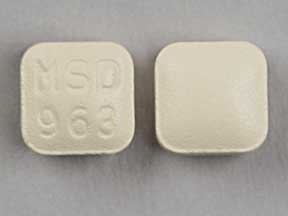Pepcid Dosage
Generic name: FAMOTIDINE 20mg
Dosage form: tablet, film coated
Drug class: H2 antagonists
Medically reviewed by Drugs.com. Last updated on Jun 1, 2024.
Recommended Dosage
Table 1 shows the recommended dosage of PEPCID 20 mg and 40 mg tablets in adult and pediatric patients weighing 40 kg and greater with normal renal function. The use of PEPCID 20 mg and 40 mg tablets is not recommended in pediatric patients weighing less than 40 kg because the lowest available strength (20 mg) exceeds the recommended dose for these patients. Use another famotidine formulation for pediatric patients weighing less than 40 kg.
|
Indication |
Recommended Dosage |
Recommended |
|
Active duodenal |
40 mg once daily; or 20 mg |
Up to 8 weeks |
|
Active gastric ulcer |
40 mg once daily |
Up to 8 weeksc |
|
Symptomatic |
20 mg twice daily |
Up to 6 weeksc |
|
Erosive esophagitis |
20 mg twice daily; or 40 mg |
Up to 12 weeks |
|
Pathological |
Starting dosage: 20 mg every 6 |
As clinically indicated |
|
Reduction of the |
20 mg once daily |
1 yearc or as clinically indicated |
Dosage in Renal Impairment
Dosage adjustments of PEPCID are recommended for patients with moderate to severe renal impairment (creatinine clearance less than 60 mL/min). Table 2 shows the recommended maximum dosage of PEPCID 20 mg or 40 mg tablets for patients with renal impairment, by indication. Use the lowest effective dose. Some dosage adjustments may require switching to other formulations of famotidine (e.g., oral suspension, lower dose tablet).
|
Indication |
Recommended Maximum Dosages |
|
|
Creatinine clearance |
Creatinine clearance less |
|
|
Active duodenal |
20 mg once daily; or |
20 mg every other day |
|
Active gastric ulcer |
20 mg once daily; or |
20 mg every other daya |
|
Symptomatic nonerosive GERD |
20 mg once daily |
20 mg every other daya |
|
Erosive esophagitis |
20 mg once daily; or |
20 mg every other daya,b |
|
40 mg once dailyb |
20 mg once dailyb |
|
|
Pathological |
Avoid used |
|
|
Reduction of the risk |
20 mg every other daya |
(see footnote)e |
Frequently asked questions
- Can you take famotidine long term?
- Is famotidine safer than omeprazole for heartburn?
- Can I take omeprazole in the morning and famotidine at night?
More about Pepcid (famotidine)
- Check interactions
- Compare alternatives
- Pricing & coupons
- Reviews (10)
- Drug images
- Side effects
- During pregnancy
- Support group
- Drug class: H2 antagonists
- Breastfeeding
- En español
Patient resources
Other brands
Professional resources
Other brands
Acid Reducer Maximum Strength, Acid Controller Original Strength, Heartburn Relief Maximum Strength, Acid Controller Maximum Strength
Other formulations
Related treatment guides
See also:
Further information
Always consult your healthcare provider to ensure the information displayed on this page applies to your personal circumstances.


